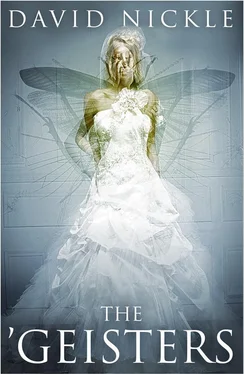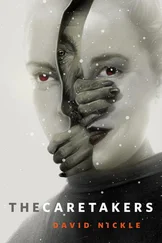Michael barked a laugh as Ann punched him in the shoulder.
The camera came down on the treeline, then the rooftop, and then the milling guests outside Rickhardt’s winery. The image faded to sepia and froze, and the title faded in.
THE JOINING OF TWO
And there was a date, and a location, and their names, and then the whole picture swam out of focus.
Literally.
As the trumpet faded out, it seemed as though the picture spun—as though Ann were spinning herself, dizzily reeling in a dance across the floor of Rickhardt’s winery. She couldn’t say how he did it—the screen simply shifted from a sepia exterior to an interior pan across a row of inverted wine glasses, a fiery stand of maples seen through a window.
And yet…
“Wow,” she said, and looked down and took a sip from her beer.
“Wow,” echoed Rickhardt, softly.
The camera was moving along the floor now, or near to it, past rows of guests seated in front of the dais where she and Michael would say their vows. Michael was at the front, hands crossed in front of him, smiling in genial terror. She would have been in the limousine still, sipping a small flute of champagne with Lesley at her side.
This was the part of things she hadn’t seen.
Faces, now—most of them strangers, some of whom she might know the name of—some of whom she knew more intimately. The lens drew across each of them, fading between so that sometimes one might seem to morph into another. Drew Sloan, one of the partners at Michael’s firm, laughed as he blended into the hollowed cheek of an older woman, who brushed a lock of her blonde hair from her eye and looked past the camera with wry approval, as she melted into the face of a young African boy, who looked bored and sullen, sitting in his chair beside his mother and transforming—into Jeanie Yang.
“Shh,” said Ann, as Ian kicked off a sandal, and it thumped on the floor. She leaned forward.
Jeanie was wearing a dark blue satiny dress, her black hair braided tight at the back of her neck. She was standing and talking and laughing, her purse under one arm, her other reaching out as if to touch the shoulder of her companion. But the camera pulled out to show her standing, alone. Who was she talking to? Someone on her Bluetooth maybe? Hard to say, because she quickly slid away. In her place sat Susan Rickhardt, Ian’s wife.
She had not been having a good day that day (Ann had never seen Susan having a good day), but this shot made the most of her. She was seated by a tall window that overlooked the vineyard. The sun came in at a high angle. It caught the fringe of her pageboy haircut, illuminated the ridge of her wide nose and perhaps, the hint of a smile—and bathed it all in a warm, golden glow. She might have been in Tuscany that afternoon. She saw the camera, turned, broadened her smile to just shy of Mona Lisa amperage, and with two fingers made a tiny wave.
And the screen went black.
It couldn’t have stayed black for as long as it seemed to; the single breath that Ann drew as Susan Rickhardt ended her wave couldn’t have sustained her.
The editor was working his art again, and the act of transition was somehow transformed into something more. But this time, Ann didn’t feel as though she were spinning; she felt herself a fixed point in space and time. All of it slowed to an instant, and that instant stretched.
At first, Ann thought she couldn’t look away, that something was holding her gaze on the screen. As the breath rasped through her throat, she began to think that she could look away, could look anywhere she wanted in fact—but the blackness had replaced everything else, so it didn’t matter. Ann began to panic. It manifested in attempts—at screaming, at getting up, at just asking Ian Rickhardt: Please could you turn it off a moment? Nothing would come of it, though. She wondered if she might be dead.
And here was the fulcrum of it, as Eva might say. The point where we can make a choice: dead or alive.
Ann wasn’t going to be dead.
And thinking of Eva, Ann began to imagine—to construct—to inhabit—the safe place.
It was a struggle; she recalled that first time, sitting with Eva at the hospital, building the castle stone by stone in her mind, clearing the woods around it… fashioning, or at least conceiving, the architectural details. It was a true act of creation.
Here, creation was barred from her. She saw the place she and Eva had made as through a dense fog. Standing in the high corridor, the fog’s tendrils clutched and flowed through the tall windows. Ahead, a blackened branch poked through. She could barely see anything; when she willed a candle, it snuffed out.
She shuffled down the corridor, which was, she discovered, covered in mud. Sensation returned to her as she did. She felt the cool mud between her toes, rotten leaves sliding beneath her bare heel. She ducked beneath the branch, felt its bare twigs catching in her hair.
She stood in front of the door to the tower room, the rot of swamp, of cesspool, filling her nostrils.
And there, she stood and listened.
Wood scraped against stone—as though a great trunk were being dragged across the floor of the tower room, one end to the other. The dragging stopped. There came a creaking sound then. And a great exhalation of air, as though an old man, an old woman for that matter, had just finished a big job.
Then came a humming, and a scratching—with an occasional rending sound, as though a claw had found purchase in the wood.
The humming sounded like a man. The tune was hard to place. It might have been random. It sounded like insanity.
Quiet down , Ann wanted to say. Behave .
But she still couldn’t summon the voice to say that. She was still drawing that single breath, and she could only watch—as her lungs filled—as the door buckled—
—and cracked.
“Hey li’ si’.”
She was looking at Philip. He was wearing his jacket-and-tie wedding uniform, although she could only see the collar, the knot of tie, because the camera was in close. His mouth was twisting like it was its own creature; his eyes, though, were steady, gazing straight into the camera as he tried to say, Hey little sister .
“Con’a—hin,” he said. Congratulations.
Ann coughed, and gasped, and sucked in lungfuls of fresh air.
“Oo boofoo.” You’re beautiful.
She looked around, sat up on the sofa, and took stock of her situation.
The living room was darker than it had been when the video began. Michael and Ian were gone.
“Uv oo,” said Philip from the wall.
I love you .
Another wicked bass line came up—“Bang a Gong” by T-Rex; actually one of Ann’s choices—and the scene cross-faded to a shot of Ann and Michael and Lesley dancing, very badly, while Mr. T-Rex went on about how dirty, sweet, skinny and black-clad his girl was.
Ann got to her feet. She was unsteady. Her mouth tasted sour—of too much beer. Had she had too much beer? That might explain things. She rubbed a chill out of her arms.
T-Rex’s girl was weak, and also had hydra teeth. This was Jeanie, bopping side to side as she breached the fringe of the dance, showing every one of those teeth in a broad grin. She and Bridal-Ann faced off on the screen and yelled at each other to bang gongs, get things on.
Where were the men? Ann did a check of the main floor. The kitchen was empty, pristine. The entry hall. A little coat closet. She called out: “Michael? Ian?” as she climbed the stairs to the second floor, the bedrooms.
T-Rex went away and laughter and squealing replaced it. “Congratulations Mikey!” shouted a woman on the TV. People clapped.
Partway up the stairs, Ann steadied herself and flicked on the hall light and climbed the rest of the way. The doors to the two bedrooms were open, their interiors dark. The bathroom door was closed. So was the door to the linen closet.
Читать дальше












